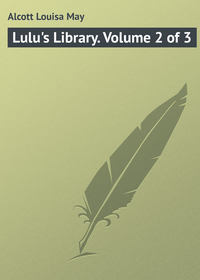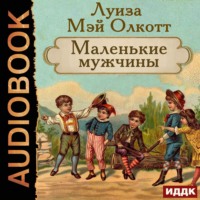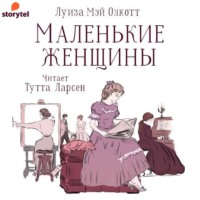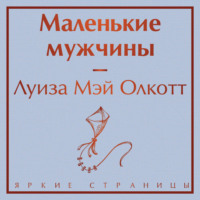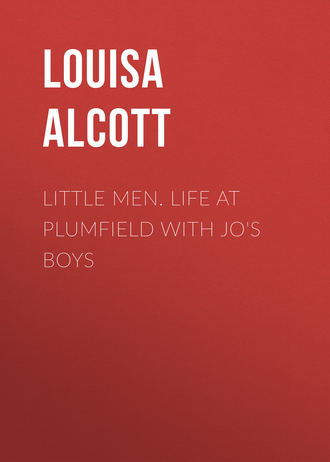 полная версия
полная версияLittle Men. Life at Plumfield with Jo's Boys
“What is your menagerie?” asked Nat, as they trotted along the drive that encircled the house.
“We all have pets, you see, and we keep ’em in the corn-barn, and call it the menagerie. Here you are. Isn’t my guinea-pig a beauty?” and Tommy proudly presented one of the ugliest specimens of that pleasing animal that Nat ever saw.
“I know a boy with a dozen of ’em, and he said he’d give me one, only I hadn’t any place to keep it, so I couldn’t have it. It was white, with black spots, a regular rouser, and maybe I could get it for you if you’d like it,” said Nat, feeling it would be a delicate return for Tommy’s attentions.
“I’d like it ever so much, and I’ll give you this one, and they can live together if they don’t fight. Those white mice are Rob’s, Franz gave ’em to him. The rabbits are Ned’s, and the bantams outside are Stuffy’s. That box thing is Demi’s turtle-tank, only he hasn’t begun to get ’em yet. Last year he had sixty-two, whackers some of ’em. He stamped one of ’em with his name and the year, and let it go; and he says maybe he will find it ever so long after and know it. He read about a turtle being found that had a mark on it that showed it must be hundreds of years old. Demi’s such a funny chap.”
“What is in this box?” asked Nat, stopping before a large deep one, half-full of earth.
“Oh, that’s Jack Ford’s worm-shop. He digs heaps of ’em and keeps ’em here, and when we want any to go a fishing with, we buy some of him. It saves lots of trouble, only he charged too much for ’em. Why, last time we traded I had to pay two cents a dozen, and then got little ones. Jack’s mean sometimes, and I told him I’d dig for myself if he didn’t lower his prices. Now, I own two hens, those gray ones with top knots, first-rate ones they are too, and I sell Mrs. Bhaer the eggs, but I never ask her more than twenty-five cents a dozen, never! I’d be ashamed to do it,” cried Tommy, with a glance of scorn at the worm-shop.
“Who owns the dogs?” asked Nat, much interested in these commercial transactions, and feeling that T. Bangs was a man whom it would be a privilege and a pleasure to patronize.
“The big dog is Emil’s. His name is Christopher Columbus. Mrs. Bhaer named him because she likes to say Christopher Columbus, and no one minds it if she means the dog,” answered Tommy, in the tone of a showman displaying his menagerie. “The white pup is Rob’s, and the yellow one is Teddy’s. A man was going to drown them in our pond, and Pa Bhaer wouldn’t let him. They do well enough for the little chaps, I don’t think much of ’em myself. Their names are Castor and Pollux.”
“I’d like Toby the donkey best, if I could have anything, it’s so nice to ride, and he’s so little and good,” said Nat, remembering the weary tramps he had taken on his own tired feet.
“Mr. Laurie sent him out to Mrs. Bhaer, so she shouldn’t carry Teddy on her back when we go to walk. We’re all fond of Toby, and he’s a first-rate donkey, sir. Those pigeons belong to the whole lot of us, we each have our pet one, and go shares in all the little ones as they come along. Squabs are great fun; there ain’t any now, but you can go up and take a look at the old fellows, while I see if Cockletop and Granny have laid any eggs.”
Nat climbed up a ladder, put his head through a trap door and took a long look at the pretty doves billing and cooing in their spacious loft. Some on their nests, some bustling in and out, and some sitting at their doors, while many went flying from the sunny housetop to the straw-strewn farmyard, where six sleek cows were placidly ruminating.
“Everybody has got something but me. I wish I had a dove, or a hen, or even a turtle, all my own,” thought Nat, feeling very poor as he saw the interesting treasures of the other boys. “How do you get these things?” he asked, when he joined Tommy in the barn.
“We find ’em, or buy ’em, or folks give ’em to us. My father sends me mine; but as soon as I get egg money enough, I’m going to buy a pair of ducks. There’s a nice little pond for ’em behind the barn, and people pay well for duck-eggs, and the little duckies are pretty, and it’s fun to see ’em swim,” said Tommy, with the air of a millionaire.
Nat sighed for he had neither father nor money, nothing in the wide world but an old empty pocket-book, and the skill that lay in his ten finger tips. Tommy seemed to understand the question and the sigh which followed his answer, for after a moment of deep thought, he suddenly broke out, —
“Look here, I’ll tell you what I’ll do. If you will hunt eggs for me, I hate it, I’ll give you one egg out of every dozen. You keep account, and when you’ve had twelve, Mother Bhaer will give you twenty-five cents for ’em, and then you can buy what you like, don’t you see?”
“I’ll do it! What a kind feller you are, Tommy!” cried Nat, quite dazzled by this brilliant offer.
“Pooh! that is not anything. You begin now and rummage the barn, and I’ll wait here for you. Granny is cackling, so you’re sure to find one somewhere,” and Tommy threw himself down on the hay with a luxurious sense of having made a good bargain, and done a friendly thing.
Nat joyfully began his search, and went rustling from loft to loft till he found two fine eggs, one hidden under a beam, and the other in an old peck measure, which Mrs. Cockletop had appropriated.
“You may have one and I’ll have the other, that will just make up my last dozen, and to-morrow we’ll start fresh. Here, you chalk your account up near mine, and then we’ll be all straight,” said Tommy, showing a row of mysterious figures on the smooth side of an old winnowing machine.
With a delightful sense of importance, the proud possessor of one egg opened his account with his friend, who laughingly wrote above the figures these imposing words,
“T. Bangs & Co.”Poor Nat found them so fascinating that he was with difficulty persuaded to go and deposit his first piece of portable property in Asia’s store-room. Then they went on again, and having made the acquaintance of the two horses, six cows, three pigs, and one Alderney “Bossy,” as calves are called in New England, Tommy took Nat to a certain old willow-tree that overhung a noisy little brook. From the fence it was an easy scramble into a wide niche between the three big branches, which had been cut off to send out from year to year a crowd of slender twigs, till a green canopy rustled overhead. Here little seats had been fixed, and in a hollow place a closet made big enough to hold a book or two, a dismantled boat, and several half-finished whistles.
“This is Demi’s and my private place; we made it, and nobody can come up unless we let ’em, except Daisy, we don’t mind her,” said Tommy, as Nat looked with delight from the babbling brown water below to the green arch above, where bees were making a musical murmur as they feasted on the long yellow blossoms that filled the air with sweetness.
“Oh, it’s just beautiful!” cried Nat. “I do hope you’ll let me up sometimes. I never saw such a nice place in all my life. I’d like to be a bird, and live here always.”
“It is pretty nice. You can come if Demi don’t mind, and I guess he won’t, because he said last night that he liked you.”
“Did he?” and Nat smiled with pleasure, for Demi’s regard seemed to be valued by all the boys, partly because he was Father Bhaer’s nephew, and partly because he was such a sober, conscientious little fellow.
“Yes; Demi likes quiet chaps, and I guess he and you will get on if you care about reading as he does.”
Poor Nat’s flush of pleasure deepened to a painful scarlet at those last words, and he stammered out, —
“I can’t read very well; I never had any time; I was always fiddling round, you know.”
“I don’t love it myself, but I can do it well enough when I want to,” said Tommy, after a surprised look, which said as plainly as words, “A boy twelve years old and can’t read!”
“I can read music, anyway,” added Nat, rather ruffled at having to confess his ignorance.
“I can’t;” and Tommy spoke in a respectful tone, which emboldened Nat to say firmly, —
“I mean to study real hard and learn every thing I can, for I never had a chance before. Does Mr. Bhaer give hard lessons?”
“No, he isn’t a bit cross; he sort of explains and gives you a boost over the hard places. Some folks don’t; my other master didn’t. If we missed a word, didn’t we get raps on the head!” and Tommy rubbed his own pate as if it tingled yet with the liberal supply of raps, the memory of which was the only thing he brought away after a year with his “other master.”
“I think I could read this,” said Nat, who had been examining the books.
“Read a bit, then; I’ll help you,” resumed Tommy, with a patronizing air.
So Nat did his best, and floundered through a page with many friendly “boosts” from Tommy, who told him he would soon “go it” as well as anybody. Then they sat and talked boy-fashion about all sorts of things, among others, gardening; for Nat, looking down from his perch, asked what was planted in the many little patches lying below them on the other side of the brook.
“These are our farms,” said Tommy. “We each have our own patch, and raise what we like in it, only we have to choose different things, and can’t change till the crop is in, and we must keep it in order all summer.”
“What are you going to raise this year?”
“Wal, I cattleated to hev beans, as they are about the easiest crop a-goin’.”
Nat could not help laughing, for Tommy had pushed back his hat, put his hands in his pockets, and drawled out his words in unconscious imitation of Silas, the man who managed the place for Mr. Bhaer.
“Come, you needn’t laugh; beans are ever so much easier than corn or potatoes. I tried melons last year, but the bugs were a bother, and the old things wouldn’t get ripe before the frost, so I didn’t have but one good water and two little ‘mush mellions,’” said Tommy, relapsing into a “Silasism” with the last word.
“Corn looks pretty growing,” said Nat, politely, to atone for his laugh.
“Yes, but you have to hoe it over and over again. Now, six weeks’ beans only have to be done once or so, and they get ripe soon. I’m going to try ’em, for I spoke first. Stuffy wanted ’em, but he’s got to take peas; they only have to be picked, and he ought to do it, he eats such a lot.”
“I wonder if I shall have a garden?” said Nat, thinking that even corn-hoeing must be pleasant work.
“Of course you will,” said a voice from below, and there was Mr. Bhaer returned from his walk, and come to find them, for he managed to have a little talk with every one of the lads sometime during the day, and found that these chats gave them a good start for the coming week.
Sympathy is a sweet thing, and it worked wonders here, for each boy knew that Father Bhaer was interested in him, and some were readier to open their hearts to him than to a woman, especially the older ones, who liked to talk over their hopes and plans, man to man. When sick or in trouble they instinctively turned to Mrs. Jo, while the little ones made her their mother-confessor on all occasions.
In descending from their nest, Tommy fell into the brook; being used to it, he calmly picked himself out and retired to the house to be dried. This left Nat to Mr. Bhaer, which was just what he wished, and, during the stroll they took among the garden plots, he won the lad’s heart by giving him a little “farm,” and discussing crops with him as gravely as if the food for the family depended on the harvest. From this pleasant topic they went to others, and Nat had many new and helpful thoughts put into a mind that received them as gratefully as the thirsty earth had received the warm spring rain. All supper time he brooded over them, often fixing his eyes on Mr. Bhaer with an inquiring look, that seemed to say, – “I like that, do it again, sir.” I don’t know whether the man understood the child’s mute language or not, but when the boys were all gathered together in Mrs. Bhaer’s parlor for the Sunday evening talk, he chose a subject which might have been suggested by the walk in the garden.
As he looked about him Nat thought it seemed more like a great family than a school, for the lads were sitting in a wide half-circle round the fire, some on chairs, some on the rug, Daisy and Demi on the knees of Uncle Fritz, and Rob snugly stowed away in the back of his mother’s easy-chair, where he could nod unseen if the talk got beyond his depth. Every one looked quite comfortable, and listened attentively, for the long walk made rest agreeable, and as every boy there knew that he would be called upon for his views, he kept his wits awake to be ready with an answer.
“Once upon a time,” began Mr. Bhaer, in the dear old-fashioned way, “there was a great and wise gardener who had the largest garden ever seen. A wonderful and lovely place it was, and he watched over it with the greatest skill and care, and raised all manner of excellent and useful things. But weeds would grow even in this fine garden; often the ground was bad and the good seeds sown in it would not spring up. He had many under gardeners to help him. Some did their duty and earned the rich wages he gave them; but others neglected their parts and let them run to waste, which displeased him much. But he was very patient, and for thousands and thousands of years he worked and waited for his great harvest.”
“He must have been pretty old,” said Demi, who was looking straight into Uncle Fritz’s face, as if to catch every word.
“Hush, Demi, it’s a fairy story,” whispered Daisy.
“No, I think it’s a arrygory,” said Demi.
“What is a arrygory?” called out Tommy, who was of an inquiring turn.
“Tell him, Demi, if you can, and don’t use words unless you are quite sure you know what they mean,” said Mr. Bhaer.
“I do know, Grandpa told me! A fable is a arrygory; it’s a story that means something. My ‘Story without an end’ is one, because the child in it means a soul; don’t it, Aunty?” cried Demi, eager to prove himself right.
“That’s it, dear; and Uncle’s story is an allegory, I am quite sure; so listen and see what it means,” returned Mrs. Jo, who always took part in whatever was going on, and enjoyed it as much as any boy among them.
Demi composed himself, and Mr. Bhaer went on in his best English, for he had improved much in the last five years, and said the boys did it.
“This great gardener gave a dozen or so of little plots to one of his servants, and told him to do his best and see what he could raise. Now this servant was not rich, nor wise, nor very good, but he wanted to help because the gardener had been very kind to him in many ways. So he gladly took the little plots and fell to work. They were all sorts of shapes and sizes, and some were very good soil, some rather stony, and all of them needed much care, for in the rich soil the weeds grew fast, and in the poor soil there were many stones.”
“What was growing in them besides the weeds, and stones?” asked Nat; so interested, he forgot his shyness and spoke before them all.
“Flowers,” said Mr. Bhaer, with a kind look. “Even the roughest, most neglected little bed had a bit of heart’s-ease or a sprig of mignonette in it. One had roses, sweet peas, and daisies in it,” – here he pinched the plump cheek of the little girl leaning on his arm. “Another had all sorts of curious plants in it, bright pebbles, a vine that went climbing up like Jack’s bean-stalk, and many good seeds just beginning to sprout; for, you see, this bed had been taken fine care of by a wise old man, who had worked in gardens of this sort all his life.”
At this part of the “arrygory,” Demi put his head on one side like an inquisitive bird, and fixed his bright eye on his uncle’s face, as if he suspected something and was on the watch. But Mr. Bhaer looked perfectly innocent, and went on glancing from one young face to another, with a grave, wistful look, that said much to his wife, who knew how earnestly he desired to do his duty in these little garden plots.
“As I tell you, some of these beds were easy to cultivate, – that means to take care of, Daisy, – and others were very hard. There was one particularly sunshiny little bed, that might have been full of fruits and vegetables as well as flowers, only it wouldn’t take any pains, and when the man sowed, well, we’ll say melons in this bed, they came to nothing, because the little bed neglected them. The man was sorry, and kept on trying, though every time the crop failed, all the bed said, was, ‘I forgot.’”
Here a general laugh broke out, and every one looked at Tommy, who had pricked up his ears at the word “melons,” and hung down his head at the sound of his favorite excuse.
“I knew he meant us!” cried Demi, clapping his hands. “You are the man, and we are the little gardens; aren’t we, Uncle Fritz?”
“You have guessed it. Now each of you tell me what crop I shall try to sow in you this spring, so that next autumn I may get a good harvest out of my twelve, no, thirteen, plots,” said Mr. Bhaer, nodding at Nat as he corrected himself.
“You can’t sow corn and beans and peas in us. Unless you mean we are to eat a great many and get fat,” said Stuffy, with a sudden brightening of his round, dull face as the pleasing idea occurred to him.
“He don’t mean that kind of seeds. He means things to make us good; and the weeds are faults,” cried Demi, who usually took the lead in these talks, because he was used to this sort of thing, and liked it very much.
“Yes, each of you think what you need most, and tell me, and I will help you to grow it; only, you must do your best, or you will turn out like Tommy’s melons, – all leaves and no fruit. I will begin with the oldest, and ask the mother what she will have in her plot, for we are all parts of the beautiful garden, and may have rich harvests for our Master if we love Him enough,” said Father Bhaer.
“I shall devote the whole of my plot to the largest crop of patience I can get, for that is what I need most,” said Mrs. Jo, so soberly that the lads fell to thinking in good earnest what they should say when their turns came, and some among them felt a twinge of remorse, that they had helped to use up Mother Bhaer’s stock of patience so fast.
Franz wanted perseverance, Tommy steadiness, Ned went in for good temper, Daisy for industry, Demi for “as much wiseness as Grandpa,” and Nat timidly said he wanted so many things he would let Mr. Bhaer choose for him. The others chose much the same things, and patience, good temper, and generosity seemed the favorite crops. One boy wished to like to get up early, but did not know what name to give that sort of seed; and poor Stuffy sighed out, —
“I wish I loved my lessons as much as I do my dinner, but I can’t.”
“We will plant self-denial, and hoe it and water it, and make it grow so well that next Christmas no one will get ill by eating too much dinner. If you exercise your mind, George, it will get hungry just as your body does, and you will love books almost as much as my philosopher here,” said Mr. Bhaer; adding, as he stroked the hair off Demi’s fine forehead, “You are greedy also, my son, and you like to stuff your little mind full of fairy tales and fancies, as well as George likes to fill his little stomach with cake and candy. Both are bad, and I want you to try something better. Arithmetic is not half so pleasant as ‘Arabian Nights,’ I know, but it is a very useful thing, and now is the time to learn it, else you will be ashamed and sorry by and by.”
“But, ‘Harry and Lucy,’ and ‘Frank,’ are not fairy books, and they are full of barometers, and bricks, and shoeing horses, and useful things, and I’m fond of them; ain’t I, Daisy?” said Demi, anxious to defend himself.
“So they are; but I find you reading ‘Roland and Maybird’ a great deal oftener than ‘Harry and Lucy,’ and I think you are not half as fond of ‘Frank’ as you are of ‘Sinbad.’ Come, I shall make a little bargain with you both, – George shall eat but three times a day, and you shall read but one story-book a week, and I will give you the new cricket-ground; only, you must promise to play in it,” said Uncle Fritz in his persuasive way, for Stuffy hated to run about, and Demi was always reading in play hours.
“But we don’t like cricket,” said Demi.
“Perhaps not now, but you will when you know it. Besides, you do like to be generous, and the other boys want to play, and you can give them the new ground if you choose.”
This was taking them both on the right side, and they agreed to the bargain, to the great satisfaction of the rest.
There was a little more talk about the gardens, and then they all sang together. The band delighted Nat, for Mrs. Bhaer played the piano, Franz the flute, Mr. Bhaer a bass viol, and he himself the violin. A very simple little concert, but all seemed to enjoy it, and old Asia, sitting in the corner, joined at times with the sweetest voice of any, for in this family, master and servant, old and young, black and white, shared in the Sunday song, which went up to the Father of them all. After this they each shook hands with Father Bhaer; Mother Bhaer kissed them every one from sixteen-year-old Franz to little Rob, who kept the tip of her nose for his own particular kisses, and then they trooped up to bed.
The light of the shaded lamp that burned in the nursery shone softly on a picture hanging at the foot of Nat’s bed. There were several others on the walls, but the boy thought there must be something peculiar about this one, for it had a graceful frame of moss and cones about it, and on a little bracket underneath stood a vase of wild flowers freshly gathered from the spring woods. It was the most beautiful picture of them all, and Nat lay looking at it, dimly feeling what it meant, and wishing he knew all about it.
“That’s my picture,” said a little voice in the room. Nat popped up his head, and there was Demi in his night-gown pausing on his way back from Aunt Jo’s chamber, whither he had gone to get a cot for a cut finger.
“What is he doing to the children?” asked Nat.
“That is Christ, the Good Man, and He is blessing the children. Don’t you know about Him?” said Demi, wondering.
“Not much, but I’d like to, He looks so kind,” answered Nat, whose chief knowledge of the Good Man consisted in hearing His name taken in vain.
“I know all about it, and I like it very much, because it is true,” said Demi.
“Who told you?”
“My Grandpa, he knows every thing, and tells the best stories in the world. I used to play with his big books, and make bridges, and railroads, and houses, when I was a little boy,” began Demi.
“How old are you now?” asked Nat, respectfully.
“’Most ten.”
“You know a lot of things, don’t you?”
“Yes; you see my head is pretty big, and Grandpa says it will take a good deal to fill it, so I keep putting pieces of wisdom into it as fast as I can,” returned Demi, in his quaint way.
Nat laughed, and then said soberly, —
“Tell on, please.”
And Demi gladly told on without pause or punctuation. “I found a very pretty book one day and wanted to play with it, but Grandpa said I mustn’t, and showed me the pictures, and told me about them, and I liked the stories very much, all about Joseph and his bad brothers, and the frogs that came up out of the sea, and dear little Moses in the water, and ever so many more lovely ones, but I like about the Good Man best of all, and Grandpa told it to me so many times that I learned it by heart, and he gave me this picture so I shouldn’t forget, and it was put up here once when I was sick, and I left it for other sick boys to see.”
“What makes Him bless the children?” asked Nat, who found something very attractive in the chief figure of the group.
“Because He loved them.”
“Were they poor children?” asked Nat, wistfully.
“Yes, I think so; you see some haven’t got hardly any clothes on, and the mothers don’t look like rich ladies. He liked poor people, and was very good to them. He made them well, and helped them, and told rich people they must not be cross to them, and they loved Him dearly, dearly,” cried Demi, with enthusiasm.
“Was He rich?”
“Oh no! He was born in a barn, and was so poor He hadn’t any house to live in when He grew up, and nothing to eat sometimes, but what people gave Him, and He went round preaching to everybody, and trying to make them good, till the bad men killed Him.”
“What for?” and Nat sat up in his bed to look and listen, so interested was he in this man who cared for the poor so much.







